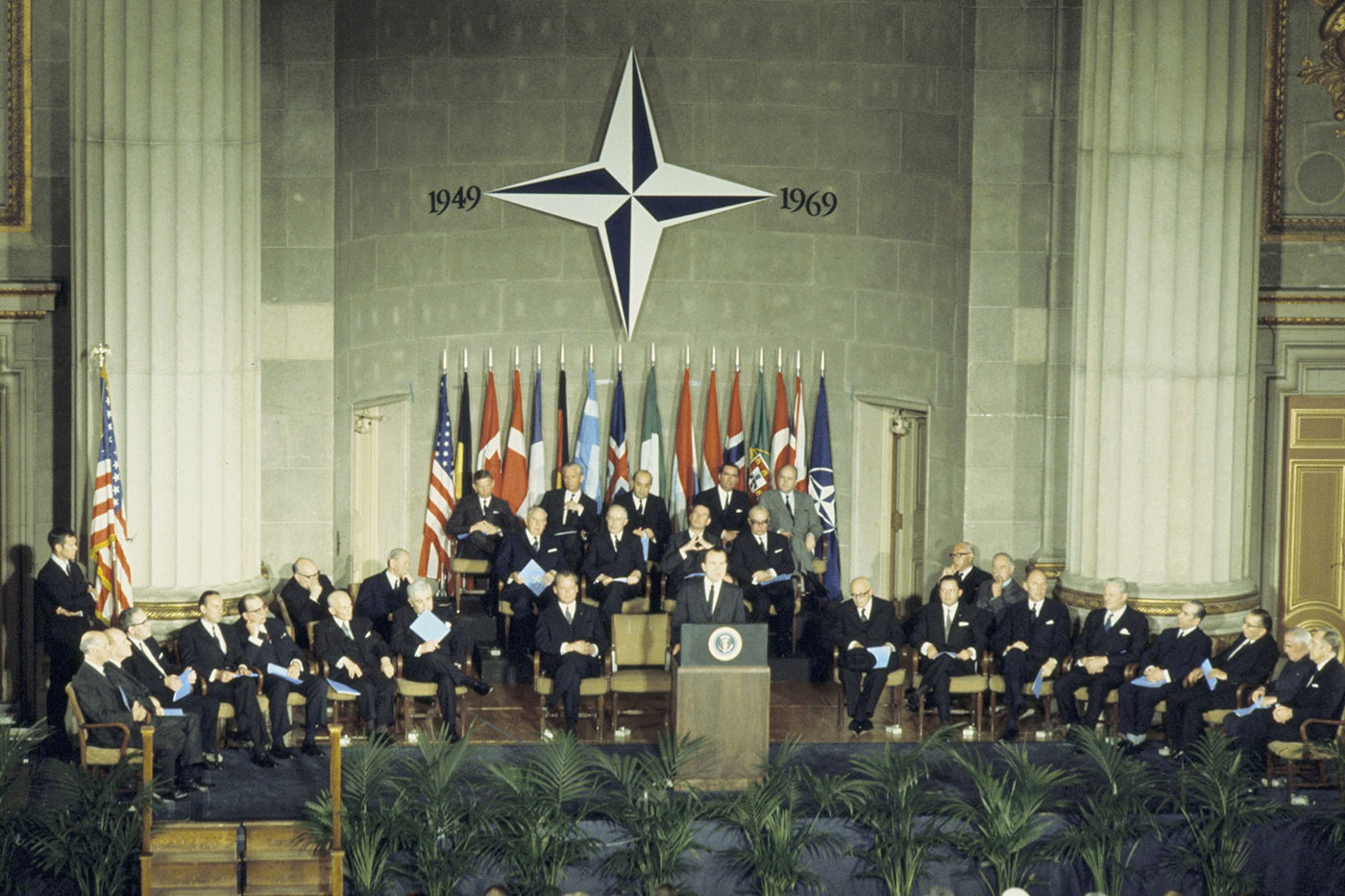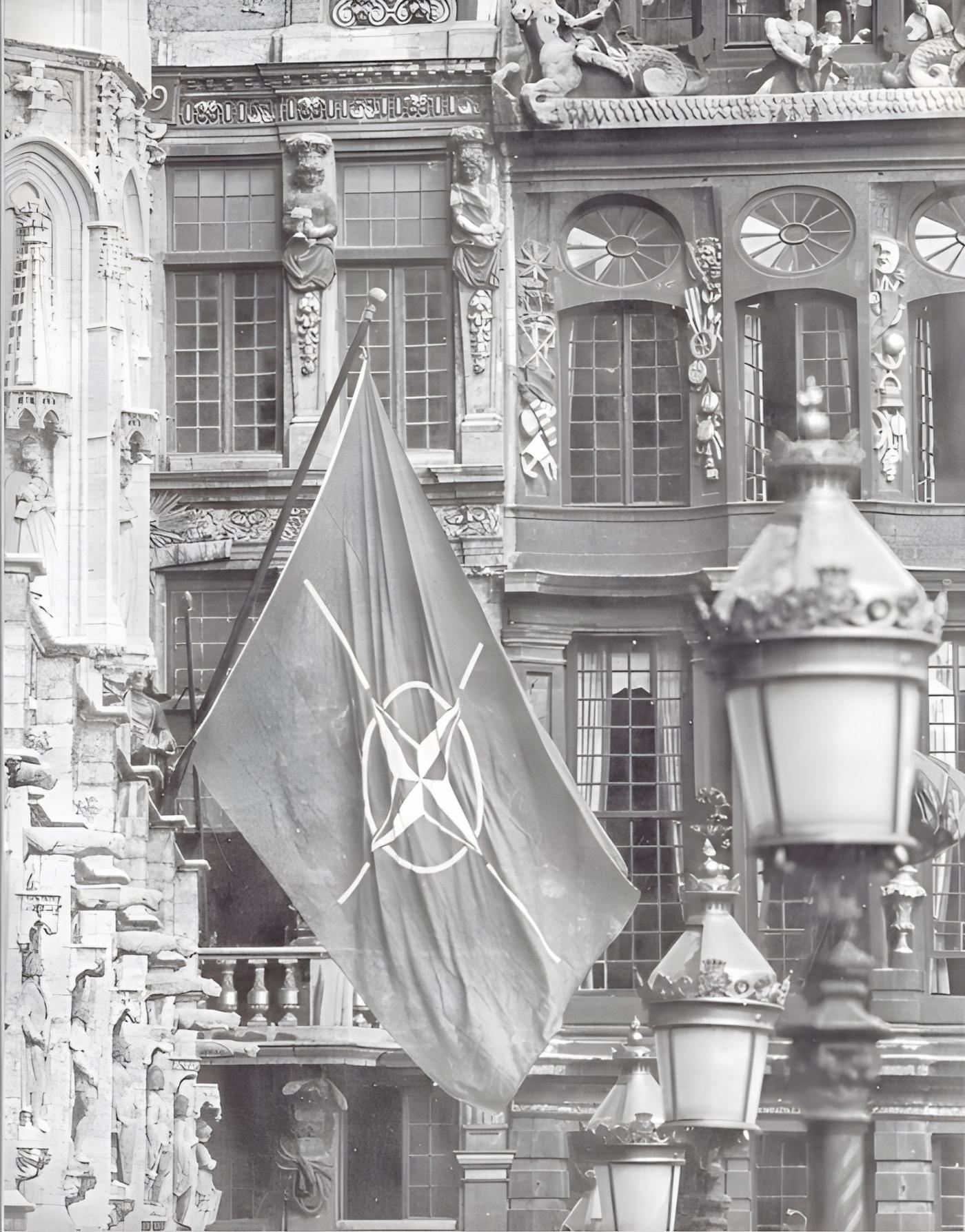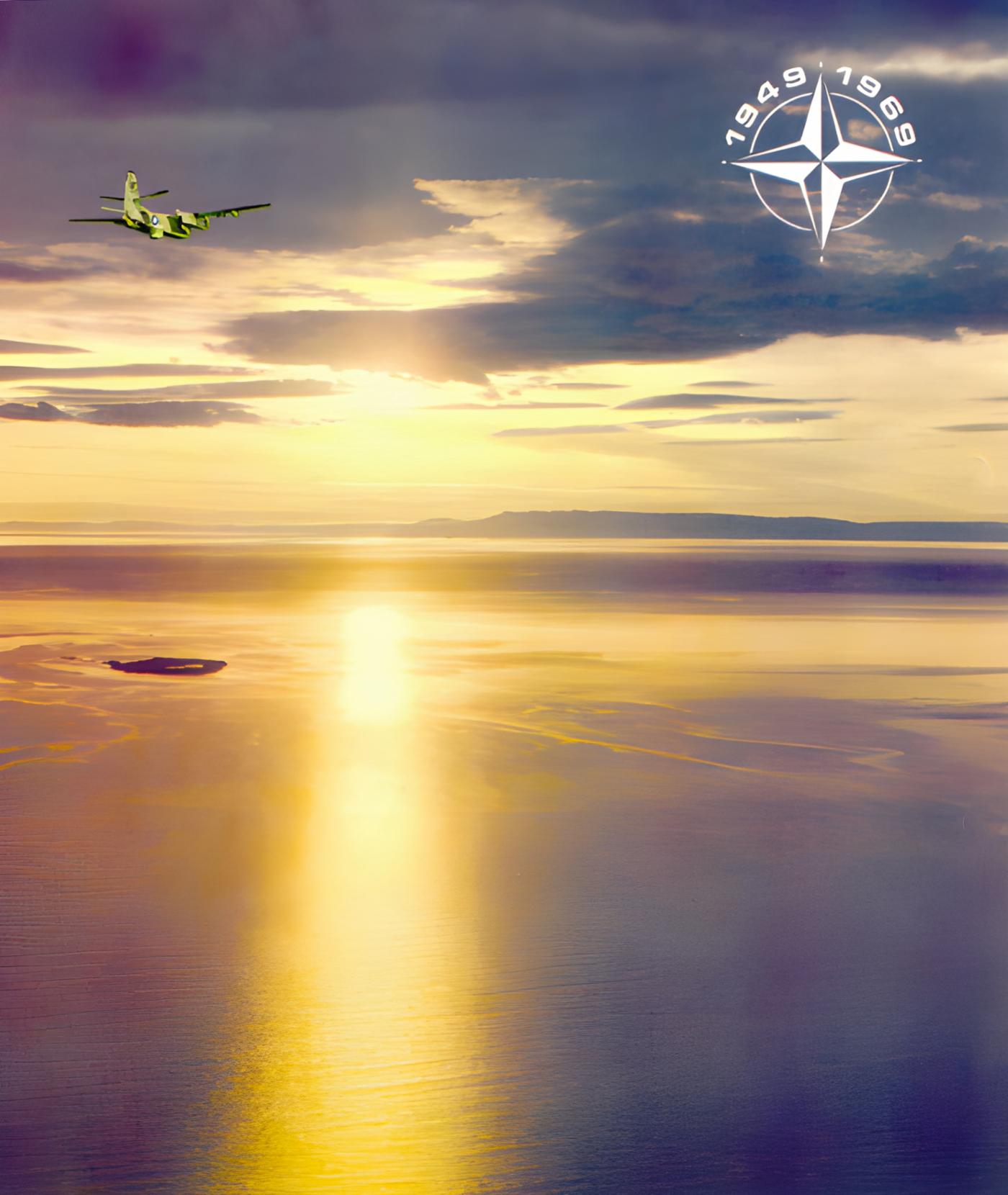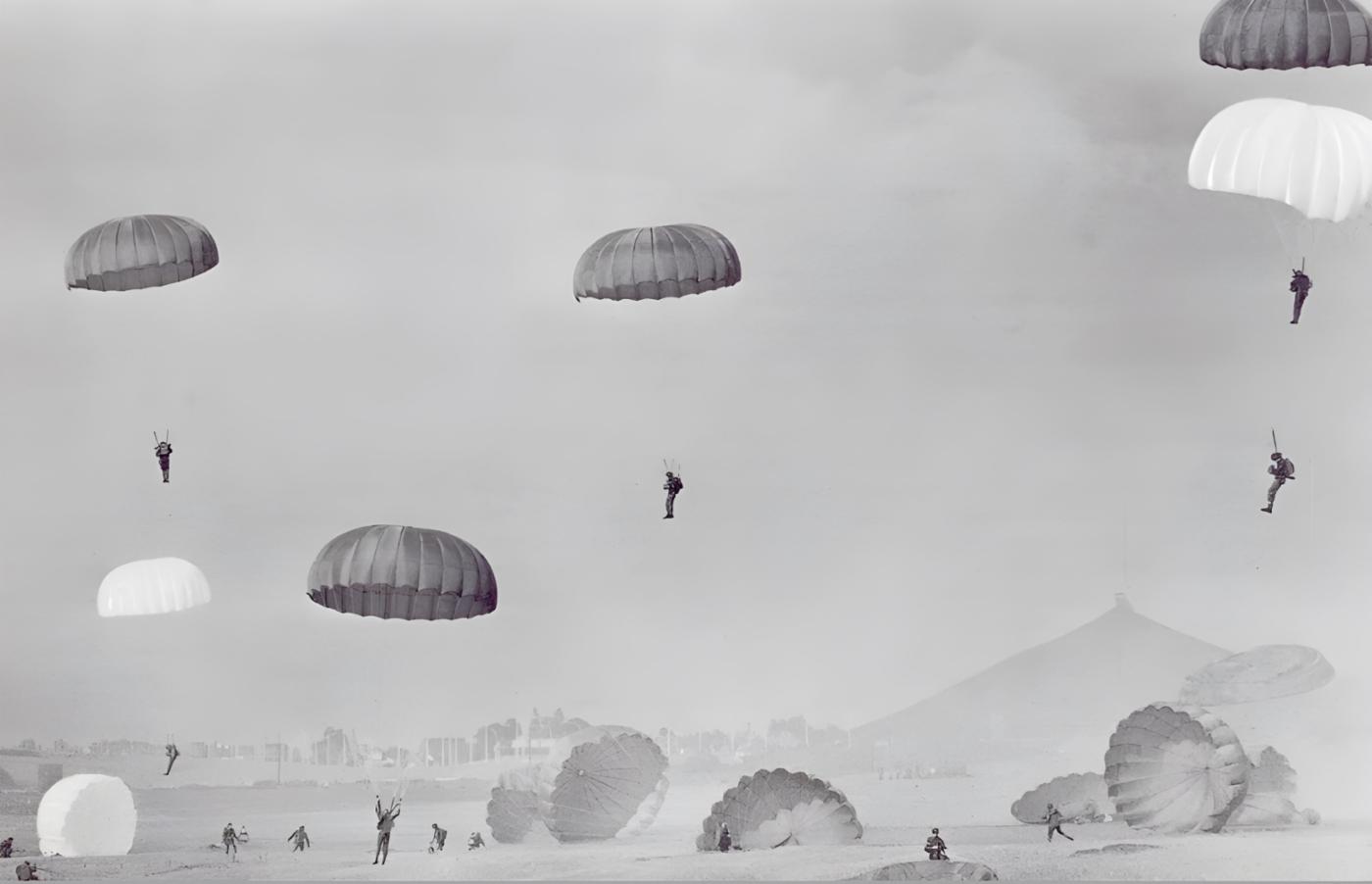Seventeen years ago, in 1952, I lunched with Sir Winston and Lady Churchill in Downing Street. It was Budget Day, a Wednesday, and the Prime Minister was due to leave very shortly afterwards for the House of Commons. As there were only the three of us, lunch was served in the private apartments on the second floor; we took coffee in a large room , overlooking St. James's Park and where the chairs were covered in a pale-coloured floral cretonne. Our conversation ranged over many topics and in particular the reform of the Atlantic Alliance which had just been decided on at the Lisbon Ministerial Meeting. A large-scale civilian organization was to be created alongside the existing military structure. A permanent political Council was to be set up in Paris with a Secretary General who would take the chair and head an international secretariat to service the new Council. On the very afternoon following this luncheon, we were due to start working out the details of the Lisbon decisions.
Before leaving us, Sir Winston said to me, with that mixture of high-flown sentiment and humour which was so characteristic of him and gave a rather prophetic ring to his utterances, and that touch of solemnity offset by his good naturedness: "Go to that Council of yours and tell them that I am giving them my right-hand man, Lord Ismay. I cannot give them a finer present or a better man". It was in this way that we learnt who was to be the first Secretary General of NATO.
It had been no easy matter to get as far as that. In diplomacy things are not obvious until they have actually happened. Until then, they seem to be impossible. The Atlantic Alliance, created in April 1949, already had an organization. But it had been hastily improvised, in the shadow of imminent danger that of Soviet aggression which nothing could apparently contain. It was at this time that Mr. Acheson, the American Secretary of State, said at a Ministerial Meeting that the USSR represented a world-wide conspiracy that was making headway under the cloak of a sovereign state.
To deal with this conspiracy, we first turned to our military defences. General Eisenhower was approached. He hesitated because the free world was in such a parlous state that he first wanted to make sure of his chances of success. Once he had accepted, he gathered around him all his old comrades-in-arms, and foremost among them Field Marshal Montgomery who brought with him a shadowy military organization deriving from the Brussels Treaty.
To complement this brilliant company whose primary duty was to get on with the job, the Governments of the Alliance had established a Committee of Ministers' Deputies, whose function was to keep the Alliance going between the infrequent Ministerial Meetings and in so doing help muster the forces necessary for the survival of the West.
The Headquarters of the Deputies was in London, in one of those large houses in Belgrave Square. Compared with the formidable military organization of the Alliance with a headquarters on the Continent, near Versailles, under the command of the victorious leader who was to become President of the United States, the Committee of Deputies was something of a lightweight. Its responsibilities were not clear-cut and there was sometimes doubt as to which minister it represented . The international military authorities regarded it as a time-consuming irrelevance in their dealings with the Defence Ministers. When things went well, it was by-passed. When things went badly, it was blamed. It had no administrative services, except those of each deputy and in certain cases that did not amount to much. At that time the Alliance was composed of twelve members. Greece and Turkey joined at the Lisbon Ministerial Meeting in 1952, and Germany in 1955. Some countries were represented on the Committee of Deputies by their ambassador in London, others by officials who came over from their capitals. This was my case for Belgium. I spent my time between Brussels, London and Paris, where I also headed the Belgian delegation to the Conference for the creation of the European army. Over a period of two years, I made 132 trips just between these three cities. The feeling of haste and the relentless pressure of events were always present.
Nevertheless, the Committee of Deputies accomplished an immensely valuable task. Despite, perhaps because of, the inadequacy of the means available, despite, perhaps because of, the trial-and-error approach to an unprecedented undertaking, its members had an enthusiasm and a faith in the future which was, one day, to justify their efforts. Under the chairmanship of the United States Deputy, Charles Spofford, a worldly-wise, tireless, determined lawyer, endowed with the gift of vision, there were men like Jonkheer van Starkenborg, whom we used to call the greatest Dutchman, which is no mean compliment; Rossi-Longhi, whose unimpassioned eloquence concealed a real depth of experience; Alphand, a clever man among clever men, with his elegant wit and elegant turn of phrase, as cunning as Ulysses; Wilgress, precise, direct, the stocky embodiment of common sense, a man who was never caught out; Sir Derek Hoyer Millar, dedicated and self-possessed , elegantly nonchalant, attentive and aloof. I ought to mention all twelve but it seems to me more appropriate to honour them collectively on the eve of this twentieth Anniversary. If the Alliance, this common venture, has become what it is, it is largely due to the notable contribution they made in its formative days. They very soon realised that to endure, the Alliance must have a life of its own, that it had to be sufficiently independent of Governments to be able to act for them without being a part of them, that it had to be an entity in its own right rather than a mere part of a whole. They realised, too, that the Alliance must become something more than a military organization since , to echo the words of the Bible, people weary of armies. This organization needed to be directed and backed up by a powerful civilian organization.
All this they prepared and as we were going through one of those new periods in which to live is to create and not to preserve the status quo, agreement was reached, in 1952, on the Lisbon reforms which determined the structure of the Alliance as it is at present. Not that it was achieved easily or without some bargaining. France, in the person of M. Robert Schumann, then Foreign Minister in the Government of M. Pinay, wanted the Headquarters of the Alliance to be transferred to Paris. The Secretary General would be English and the Supreme Commander, Europe, an American. This is what happened , but the situation did not last indefinitely since "the best laid schemes of mice and men are oft ' overthrown ".
Thus, Lord Ismay became the first Secretary General of NATO. Those who did not know him cannot appreciate what the Alliance owes him. It was Lord Ismay who fashioned the Atlantic Council into an instrument for permanent dialogue, for affable, relaxed, business-like conversation between governments. He was in the habit of saying that the first English club had been the Viking ship and we were in the same boat. A former Indian army officer, he wanted the setting of our work to be like the best mess. His clubbable nature made for unity : NATO for him was a club to which he gave a tie and a flag. He would willingly have given it a motto and even a song. These things are significant ; they reveal the presence of life. But behind this geniality there was a keeness of gaze, a toughness of mind, a firmness of character. Gradually, under his influence, the Council set about its work, conducting its business formally and sometimes informally, at ordinary meetings with summary records, at restricted meetings with or without summary records where more confidential matters would be discussed, in private meetings where it was the custom to speak more freely because the things said were remembered but not recalled.
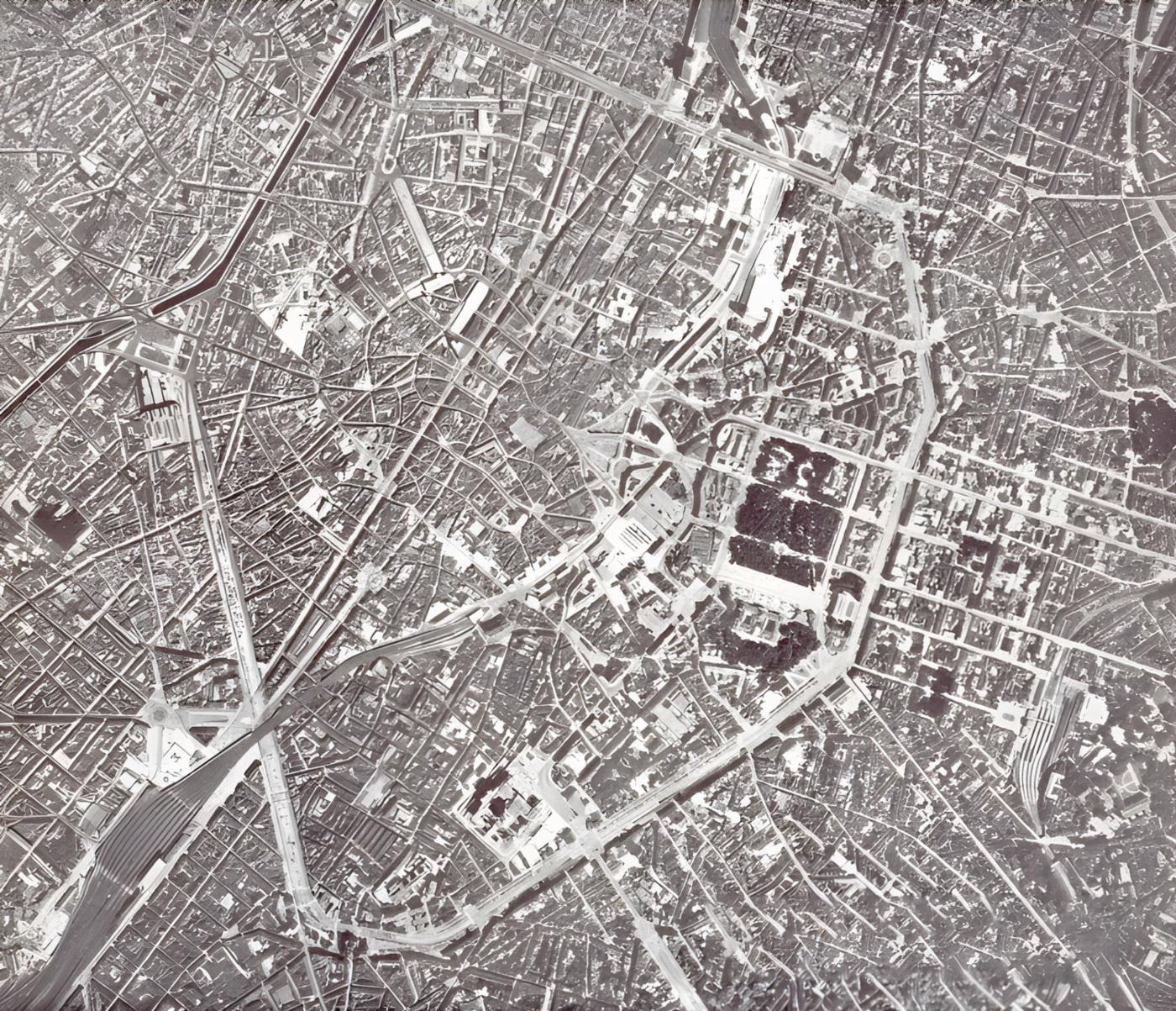
An aerial photograph of the center of Brussels, where NATO Headquarters is established and where the 15th Session of the North Atlantic Assembly was held last October
Gradually, the Council consolidated its authority at first among member countries, since nothing succeeds like success; in NATO, too, where, under the impetus of ex-General Ismay, power shifted from the military to the civil body without a loss of face. Governments wanted the facts and their representatives wanted to see for themselves. This was the agreeable time, a somewhat hectic one, when the Council led a roving existence . We were frequent visitors to the countries linked by the 7,000 kilometers from Norway to Turkey as well as to Canada and the United States. As a result, we learned to live together and at the same time to understand one another's problems. The Council forged a bond of friendship among its members.
When Lord Ismay left after five years, the Council was a flexible instrument both for hammering out and carrying out a common policy. "I have been the nurse", Lord Ismay used to say, "It is time for the governess to come". The governess was Mr. Spaak. In his hands the Council became a delicate and effective instrument of political consultation. Going beyond the notion of military protection, we began to perceive the glimmerings of a development which was to go by the name of "detente" and was the outcome of peaceful coexistence. Mr. Spaak possessed the talent of moving about easily in complicated situations. This ability to get down to essentials, which is called judgement, he possessed in the highest degree. His charm of manner and clarity of thought enabled him to go over very far along the path of political consultation, as far as it was possible to go, but not as far as he would have wished.
With him, the Council had refined the theory and practice of consultation and there was no interruption when his successor, Mr. Stikker, took over. The years had passed and a debate was now taking shape ; was the Alliance a response to a temporary situation or was it a permanent creation capable of developing into a community? Mr. Stikker defended the ideal of a community with an energy which even his broken health could not diminish. Obstinacy was one of his qualities. In order to be able to superimpose their opinions over his, a few Ambassadors had the idea of getting together over innocent lunches, without the Secretary General. Pleasure and utility created the habit.
When Mr. Brosio took over from Mr. Stikker as Secretary General, he expressed the wish to join these table-companions in a new-style arrangement. So all the Ambassadors were invited and in this way grew up that most civilised institution, one, incidentally, where the Council plays perhaps its most important role ; the weekly lunches of the Ambassadors and the Secretary General for which each is host in turn and at which conversation ranges freely and widely since no political topic is taboo. Problems are introduced sub rosa, we return to them and sometimes they are thrashed out there.
I have cast my memory back over the history of the Atlantic Council without following any definite thread . I perceive that I have scarcely broached the subject. And yet enough to realise that Churchill's phrase I mentioned at the beginning, "that Council of yours", was addressed less to me than to the partners in our Alliance. On the eve of its 20th Anniversary, I will conclude with a word about the prospects opened up by this remark. St. Basilius was asked the meaning of hope and he replied : " It is the dream of a man wide-awake". It is my hope that the Atlantic Council will increasingly act, for the countries of the Alliance, as the instrument they have created for the achievement of their common purposes, as a forward-looking institution which they can develop fully for their greater good, this Council of yours.

